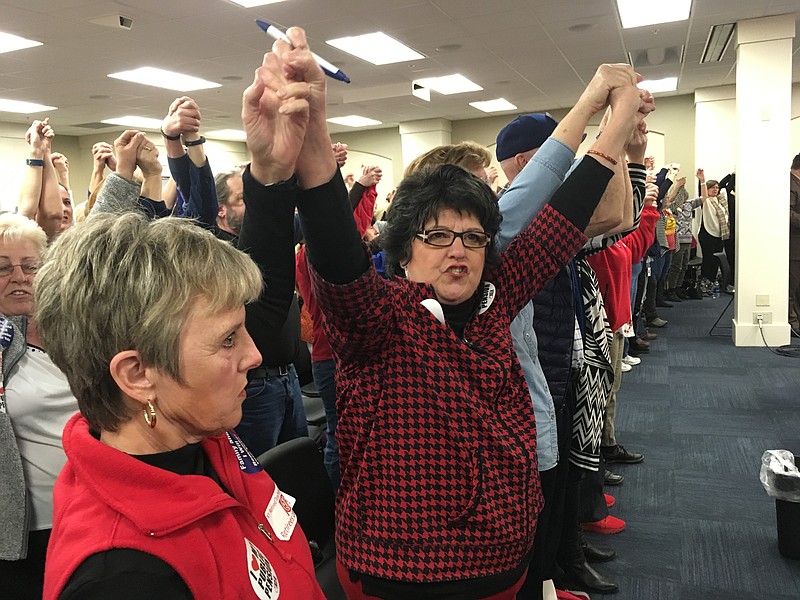As teachers in West Virginia noisily celebrated a 5 percent raise that ended their nine-day walkout, momentum was building elsewhere for similar protests over pay and benefits for the nation's public school teachers.
Teachers in Oklahoma and Arizona are contemplating actions of their own amid growing frustration over meager pay. Teachers and staff in eight Kentucky school districts were planning "walk in" rallies Thursday to protest proposed cuts to their retirement benefits. Teachers in Pittsburgh reached a tentative agreement after threatening a strike, and hundreds of educators held demonstrations this week in Jersey City, New Jersey.
The unions' victory in the West Virginia strike has given a boost to organizers who say the national spotlight on teacher pay is long overdue.
"To be able to do that there? I think people in Arizona started looking at each other saying, 'Wow!'" said Noah Karvelis, an art teacher in Phoenix who helped launch a campaign urging Arizona teachers to wear red Wednesday as a show of solidarity. The demonstration was meant to gauge interest in stronger action by teachers, who received a 1 percent pay increase this year, Karvelis said.
From West Virginia, which has some of the nation's lowest teacher salaries, unions heard familiar stories of educators struggling to get by. The teachers behind the walkout that shuttered public schools statewide said the 2 percent pay raise initially proposed would not have covered their rising health insurance costs.
Some of the teachers who returned to classrooms on Wednesday said they hope unions around the country will be encouraged by what they accomplished.
"I do think this strike can be the start of something big nationally," said Melinda Monks, a special education teacher at Bridgeview Elementary in South Charleston, West Virginia. "Because the United States, as Gov. (Jim) Justice says, has fallen behind in education, behind some of our other nations, and I think it's time that teachers step forward and demand a more central role in education and more respect for our profession."
Teacher unrest around the United States has grown as strong health care and retirement benefits, viewed in the late 1980s and 1990s as a tradeoff to slower pay growth, have begun to erode at district or state levels, said Becky Pringle, vice president of the National Educators Association.
"They're really feeling it now and they're leaving all of their options open in terms of what kinds of actions they are ready to take," she said.
The daily demonstrations and legislative back and forth were closely watched from Oklahoma, where teachers union President Alicia Priest said large numbers of teachers are leaving the profession and state because of funding cuts and compensation that lags behind surrounding states by $5,000 to $20,000. The union there is pushing for pay raises of $10,000 over three years.
"It certainly does embolden us," Priest said.
Nationally, the average teacher's salary was $58,950 in 2017, according to the National Center for Education Statistics, more than $10,000 above what teachers earn in West Virginia, Oklahoma and Arizona.
Tom Ramming, an educational policy professor at the University at Buffalo, attributed much of West Virginia's impact to its statewide scope, whereas in many other states contracts are settled at the district or county level.
"When the entire teaching force ... goes out on strike and they're united," Ramming said, "people take notice."
In the past, teachers strikes have tended to come in waves, said Georgetown University history professor Joseph McCartin. After World War II, there were about 60 strikes from 1945 to 1950. The pattern repeated in the 1970s, when teachers hurt by inflation were motivated by the civil rights and feminist movements to take action, he said.
"Success of teachers in one location tends to encourage teachers in other locations," McCartin said.
In Kentucky, where Republican lawmakers have proposed cuts to retirement benefits, hundreds of public school teachers packed a legislative hearing Wednesday, chanting "Vote them out!" after a committee advanced the bill to the Senate floor.
Brent McKim, president of the Jefferson County Teachers Association, said he hopes their efforts will stop the bill. Asked about a strike, McKim said: "Anything is possible."
Teachers at 28 schools in Kentucky were planning to gather outside of their buildings Thursday and walk in together.
Jersey City teachers, whose contract has expired, are still at the bargaining table but have approved striking if necessary, said Education Association President Ron Greco.
"I think it's certainly helping our cause," he said of the West Virginia strike.
Pittsburgh teachers reached a tentative agreement while West Virginia teachers were out on strike. Although the timing - after 19 months of negotiations - was coincidental, union President Nina Esposito-Visgitis praised the West Virginia teachers for getting people to pay attention to how teachers are compensated.
"Public education has to be a No. 1 issue on everybody's mind," said Esposito-Visgitis, whose members will vote on the agreement by March 19, "whether you have kids in the school right now or not."
